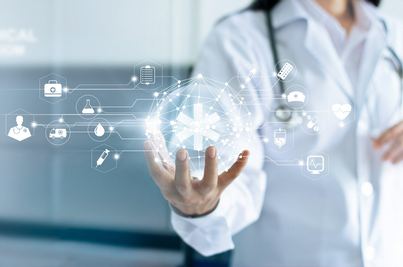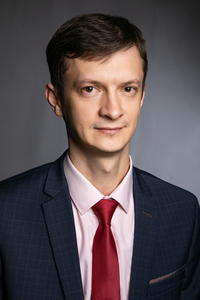
 День российской науки в этом году празднуется в год науки и технологий. О научной жизни вуза поговорили с проректором по научной работе и инновационному развитию, доктором медицинских наук, заведующим кафедрой детской хирургии и педиатрии ФПО Василием Петровичем Гаврилюком.
День российской науки в этом году празднуется в год науки и технологий. О научной жизни вуза поговорили с проректором по научной работе и инновационному развитию, доктором медицинских наук, заведующим кафедрой детской хирургии и педиатрии ФПО Василием Петровичем Гаврилюком.
- Какие научные направления в медицине вы считаете наиболее перспективными? Ведет ли вуз работу над ними?
- Научные исследования - длительный, кропотливый труд. Наука многогранна, у неё нет начала и конца. В любой момент, казалось бы, мало-мальски значимый результат, полученный в рамках студенческого научного кружка или лаборатории научно-исследовательского института может понадобиться региону, государству или даже миру.
31 декабря 2020 года Правительство Российской Федерации утвердило программу фундаментальных научных исследований до 2030 года. В ней - большой перечень ключевых направлений. Над многими из них мы уже ведем работу. Речь идет о физиологических, медико-биологических науках, клинической и профилактической медицине. В 2020 году мы приступили к новому для нас направлению, которое также есть в программе Правительства - медицинским клеточным и генно-инженерным технологиям, регенеративной медицине.
В настоящий момент в КГМУ есть четыре научно-исследовательских института: НИИ экспериментальной медицины, где существует достаточно широкий спектр лабораторий по всем направлениям, НИИ общей патологии, НИИ физиологии , НИИ генетической и молекулярной эпидемиологии. Это наши флагманы с большими человеческими ресурсами и возможностями, перспективами, лабораторной, технической базами. Они охватывают вышеупомянутые направления федеральной программы фундаментальных научных исследований. В каждом НИИ есть свои подразделения, подгруппы, руководители, которые маленькими, но планомерными шажками двигаются вперед – каждый в своей области.
В 2021 году мы планируем открыть новую лабораторию на базе НИИ экспериментальной медицины, посвященной клеточным технологиям. Используя клеточные технологии, мы сможем помогать онкологам в выборе наиболее эффективных и безопасных фармакологических препаратов для химиотерапии. Для хирургии найти более действенные методы заживления ран.
- Как вы оцениваете научную активность КГМУ?
- Качественные и количественные показатели год от года растут. В первую очередь, это публикационная активность, защита диссертационных работ. В 2020 году каждый третий аспирант вуза закончил аспирантуру защитой диссертационного исследования. Это хороший показатель, который выше среднестатистических значений по России на 13%. Если в 2019 году на 100 научно-педагогических работников университета в авторитетных изданиях международных баз цитирования «Web and Science» и «Scopus» приходилось почти 16 публикаций в год, то по результатам 2020 года мы увеличили этот показатель вдвое - до 28. Важно, что публикации наших авторов цитируются другими коллективами, вузами, что говорит о важности тех знаний, которые наши коллеги получили. Опять же, если в 2019 году на 100 научно-педагогических работников приходилось 204 цитирования публикаций в «Web and Science» и «Scopus», то в 2020 году этот показатель достиг 287. Прирост в полтора раза.
- Как оцениваете вовлеченность студентов в научную деятельность?
- В вузе созданы все условия для того, чтобы уже с первого курса студенты начали заниматься наукой. На каждой кафедре есть студенческие научные кружки. Всего их 79. Несмотря на пандемию, весь 2020 год кружки работали и вносили свой вклад в научный потенциал и эффективность работы вуза. Кроме этого, в КГМУ работает Студенческое научное общество, а на базе НИИ экспериментальной медицины - студенческая научная лаборатория. Если студенту становится «тесно» в рамках кружка, он продолжает свою деятельность в научной лаборатории НИИ под руководством Ирины Леонидовны Приваловой. Ближе к старшим курсам многие студенты проводят научные исследования на базе того или иного НИИ. Талантливых ребят мы видим, они поступают в аспирантуру, ординатуру, где продолжают работать над исследованиями, начатыми на первом курсе. Результат – защита диссертации. С первого курса я прошел все эти ступени, пользовался всеми возможностями, которые и сейчас есть у студентов. На 4-м курсе я возглавил Студенческое научное общество. Обучаясь в ординатуре, защитил кандидатскую диссертацию. Совмещал работу ассистента и врача и до сих пор продолжаю это делать, будучи в должности проректора.
- Расскажите о ключевых научных достижениях университета.
- Классический пример совместной работы над исследованиями, неразрывности студента, аспиранта, преподавателя, профессора является ежегодный конкурс инновационных проектов «Инновация и изобретение». По итогам 2020 года в номинации «Инновационная идея» дипломы за 2-е и 3-е место получили проекты коллективов сотрудников и обучающихся КГМУ: «Комплексная программа нейрокогнитивного восстановления функции памяти для лиц пожилого возраста». Коллектив авторов - Севрюкова Ирина Александровна, Запесоцкая Ирина Владимировна, Хмелевская Ирина Григорьевна. Другой проект - «Идея разработки экспертного модуля предикативного анализа перспектив индивидуальных достижений в игровых видах спорта на основе анализа мышечной активности. Над ним работали: Привалова Ирина Леонидовна, Бобровский Евгений Анатольевич, Артеменко Михаил Владимирович, Кальчинский Александр Андреевич, Пушкина Виктория Вадимовна. В составе коллективов есть проректор, заведующие кафедрами, студенты. Награждал победителей губернатор Курской области.
- Какие крупные научные гранты КГМУ получил за последнее время?
- Грантов много. В копилке университета есть индивидуальные и коллективные. Самые значимые, на мой взгляд, два гранта. Грант на 2018-2022 гг. фонда генетических исследований TRC GEN+ компании «Транс Рашен» - «Комплексное молекулярно-генетическое исследование вовлеченности полиморфизма генов ферментов биотрансформации ксенобиотиков и антиоксидантной системы в развитии рака желудка и ободочной кишки». Это на стыке генетики и онкологии. Оба направления очень взаимосвязаны, перспективны и востребованы для практического здравоохранения. Генетические исследования могут помочь в ранней диагностике онкологии, спрогнозировать это заболевание у того или иного человека. Так можно держать руку на пульсе, регулярно проходить медицинское обследование и при необходимости получить своевременное лечение. Исход заболевания будет совершенно другой и качество жизни у пациентов не пострадает.
Второй немаловажный грант мы получили в 2020 году от Российского научного фонда на проведение фундаментальных научных исследований и поисковых научных исследований: «Концепция системной вовлеченности генов ферментов редокс-гомеостаза в молекулярные механизмы развития сахарного диабета 2-го типа и его осложнений». Обладателями гранта стал коллектив под руководством профессора Полоникова Алексея Валерьевича. По результатам исследований мы надеемся получить какие-то новые методы профилактики, контроля сахарного диабета 2-го типа.
- Что бы вы пожелали молодым ученым и опытным исследователям?
- Прежде чем заняться наукой, студент должен понимать: однажды погрузившись в нее, он всю жизнь будет в маленьком или большом объеме ею заниматься. Даже если он не планирует посвятить себя науке, а хочет полностью уйти в практическое здравоохранение, он должен знать, что врач, который не открывает для себя что-то новое и не применяет это на практике, не ищет ответы на свои вопросы и вопросы пациентов, не состоится в профессии. Любому студенту нужна наука. Вуз дает все возможности для самореализации в этой сфере на всех этапах обучения. Дерзайте!
В год науки и технологий коллегам хочется пожелать реализации всех задуманных планов. Пусть найдутся все ответы на ваши вопросы.
TO THE DAY OF RUSSIAN SCIENCE: INTERVIEW WITH THE VICE-RECTOR FOR RESEARCH AND INNOVATIVE DEVELOPMENT OF KSMU
This year, the Day of Russian Science is celebrated in the year of science and technology. We talked about the scientific life of the university with the Vice-Rector for Research and Innovative Development, Doctor of Medical Sciences, Head of the Department of Pediatric Surgery and Pediatrics of PF Vasily Petrovich Gavrilyuk.
- What research directions in medicine do you consider the most promising? Does the university work on them?
- Scientific research is a long, painstaking work. Science is multifaceted, it has no beginning or end. At any moment, a seemingly more or less significant result obtained within the framework of a student scientific circle or laboratory of research and development centre may become necessary for a region, state or even the world.
On December 31, 2020, the Government of the Russian Federation approved the program of fundamental scientific research until 2030. It contains a large list of key directions. We are already working on many of them. We are talking about physiological, biomedical sciences, clinical and preventive medicine. In 2020 we embarked on a new direction for us, which is also included in the Government program - medical cell and genetic engineering technologies, regenerative medicine.
At the moment, KSMU has four research institutes: Research Institute of Experimental Medicine with fairly wide range of laboratories in all directions, Research Institute of General Pathology, Research Institute of Physiology, and Research Institute of Genetic and Molecular Epidemiology. These are our top units with great human resources and capabilities, prospects, laboratory and technical facilities. They cover the above-mentioned directions of the federal program for basic scientific research. Each research institute has its own subdivisions, subgroups, heads who move forward in small but systematic steps - each in his own area.
In 2021 we plan to open a new laboratory at Research Institute of Experimental Medicine dedicated to cellular technologies. Using cell technologies, we will be able to help oncologists in choosing the most effective and safe pharmacological drugs for chemotherapy. It will help to find more effective methods of wound healing for surgery area.
- How do you rate the research activity of KSMU?
- Qualitative and quantitative indicators are growing from year to year. First of all, this is publication activity, defense of dissertations. In 2020 every third graduate student of the university completed his postgraduate studies with the defense of a dissertation research. This is a good indicator, which is 13% higher than the average statistical values in Russia. If in 2019 there were almost 16 publications per 100 scientific and pedagogical employees of the university in the authoritative editions of the international citation bases "Web and Science" and "Scopus", then according to the results of 2020 we doubled this indicator to 28. It is important that the publications of our authors are cited by other teams, universities, which shows the importance of the knowledge that our colleagues received. Again, if in 2019 there were 204 citations of publications in “Web and Science” and “Scopus” per 100 scientific and pedagogical workers, then in 2020 this figure reached 287. The increase is one and a half times.
- How do you assess the involvement of students in the research activity?
- All conditions were created at the university so that students could be involved in the research activity from the first year of study. Each department has student scientific circles. There are 79 of them in total. Despite the pandemic, the circles worked throughout 2020 and contributed to the scientific potential and efficiency of the university. In addition, the Student Scientific Society operates in KSMU, and a student scientific laboratory is based on the Research Institute of Experimental Medicine. If a student feels "cramped" within the circle, he continues his activity in the scientific laboratory of the Research Institute under the leadership of Irina Leonidovna Privalova. Closer to senior years, many students conduct scientific research on the basis of one or another research institute. We see talented guys, they pursue postgraduate study, go to residency, where they continue working on the research, which they begun in the first year. The result is a dissertation defense. I took all these steps from the first year, used all the opportunities that students still have. I became the head of the Student Scientific Society in my 4th year. While studying in residency, I defended Candidate's dissertation. I combined the work of an assistant and a doctor, and I still continue doing this, being in the position of vice-rector.
- Tell us about the key scientific achievements of the university.
- A classic example of joint work on research, inseparability of a student, postgraduate student, teacher, professor is the annual competition of innovative projects "Innovation and Invention". At the end of 2020, in the "Innovative Idea" nomination, projects of teams of staff members and students of KSMU received diplomas for the 2nd and 3rd places: "A Comprehensive Program for Neurocognitive Restoration of Memory Function for the Elderly People." The team of authors - Irina Aleksandrovna Sevryukova, Irina Vladimirovna Zapesotskaya and Irina Grigorievna Khmelevskaya. Another project is "The Idea of Developing an Expert Module for Predictive Analysis of the Prospects for Individual Achievements in Team Sports Based on the Analysis of Muscle Activity". It was developed by: Irina Leonidovna Privalova, Evgeny Anatolyevich Bobrovsky, Mikhail Vladimirovich Artemenko, Alexander Andreevich Kal'chinsky, Victoria Vadimovna Pushkina. The teams include a vice-rector, heads of departments, students. The Governor of the Kursk region awarded the winners.
- What large scientific grants has KSMU received recently?
- There are many grants: individual and shared. The most significant, in my opinion, are two of them. Grant for 2018-2022 of the Fund for Genetic Research TRC GEN + of the "Trans Russian" company - "Complex Molecular Genetic Study of the Involvement of Gene Polymorphism of Biotransformation Enzymes of Xenobiotics and Antioxidant System in Stomach and Colon Cancer Development". It is at the intersection of genetics and oncology. Both directions are very interrelated, promising and relevant for practical healthcare. Genetic research can help in the early diagnosis of oncology, prediction of this disease. Thus, it is possible to keep your finger on the pulse, undergo regular medical examinations and receive timely treatment if necessary. The disease outcome will be completely different and the quality of life will not be affected.
We received the second important grant in 2020 from the Russian Science Foundation for fundamental scientific research and exploratory research: "The Concept of Systemic Involvement of Genes of Redox Homeostasis Enzymes in the Molecular Mechanisms of Type 2 Diabetes Mellitus Development and Its Complications". The team headed by professor Alexey Valerievich Polonikov became the winners of the grant. Based on the research results, we hope to get some new methods of prevention and control of type 2 diabetes.
- What would you like to wish young scientists and experienced researchers?
- Before taking up science, a student must understand: once immersed in it, a person will be engaged in science in a small or large volume through the whole life. Even if a student does not plan to devote the life to science, but wants to go into practical health care completely, it should be born in mind that a doctor, who does not discover something new for him/herself and does not apply it in practice, is not looking for answers to his/her questions and patient questions, will not take place in the profession. Any student needs science. The university provides all the opportunities for self-realization in this area at all stages of education. Good luck!
In the year of science and technology, I would like to wish my colleagues the implementation of all the conceived plans. Let all the answers to your questions be found.
- Все новости21117
- Поступающим419
- Образование3249
- Наука2989
- Общество3087
- Университетская жизнь5291
- Медицина1237
- Трудоустройство508
- Непрерывное образование77
- Международная деятельность385
Информационные рубрики
Главный корпус
+7(4712)588-137
305041 К.Маркса,3, г.Курск
kurskmed@mail.ru
Приемная комиссия
58-81-38
305041 К.Маркса,3, г.Курск





